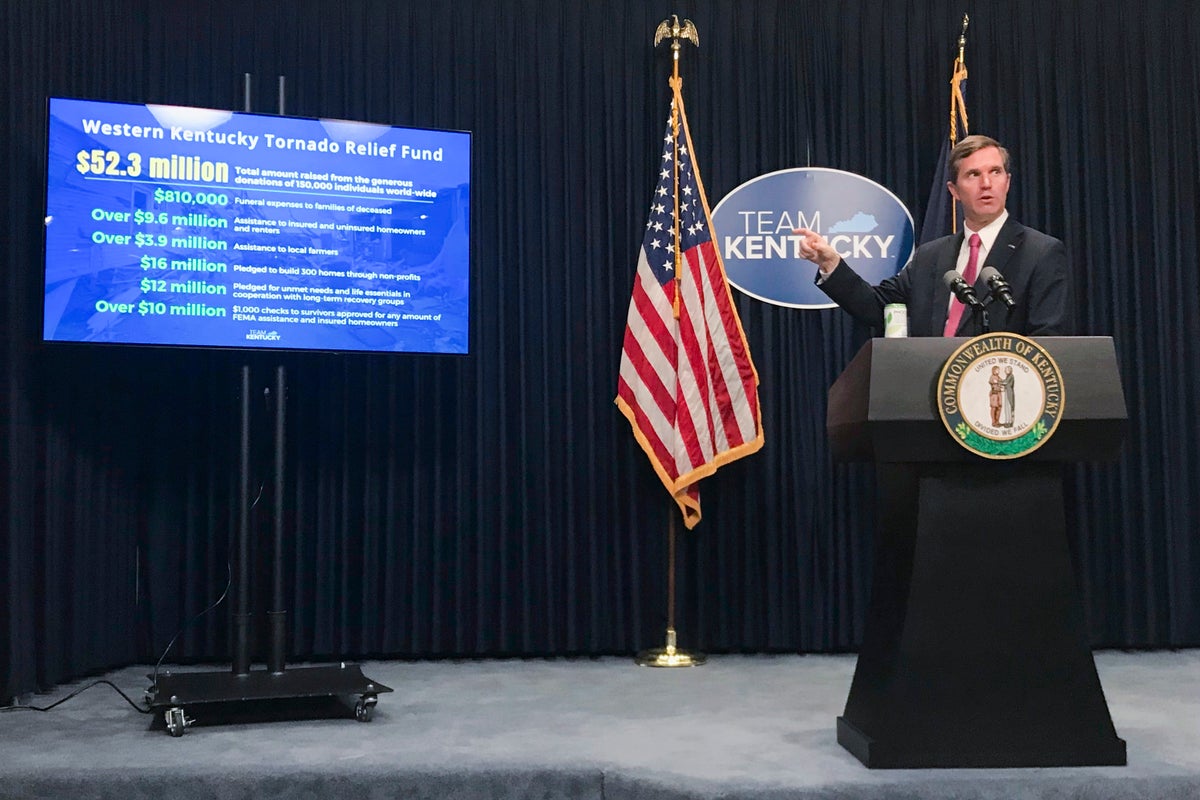
Donations that poured into a tornado relief fund started by Kentucky's Democratic governor have been spent or pledged, but Republicans are pushing for greater legislative oversight after reports surfaced that some checks went to people unaffected by the tragedy.
Gov. Andy Beshear this week stoutly defended his administration's handling of the relief fund, formed in the aftermath of deadly storms that left trails of utter destruction in portions of western Kentucky in late 2021. The scenes of devastation spurred private donations from around the world, as the Team Western Kentucky Tornado Relief Fund swelled to more than $52 million.
Beshear touted the fund's ability to respond quickly to help people in dire need, and for its level of transparency with a website tracking the distribution of money. The fund paid funeral expenses of storm victims and helped affected homeowners, renters and farmers.
“This is an open book,” Beshear said at his news conference Thursday. "Everything here is a public record. I’ve announced every single thing that we’ve done with it. It’s been on the website.”
His administration's handling of the aid came under greater scrutiny after the state Public Protection Cabinet late last year issued more than $10 million in $1,000 increments from the relief fund. Reports surfaced that some people unaffected by the tornadoes were mistakenly sent payments. The Lexington Herald-Leader and WPSD-TV reported on the misdirected checks.
State Treasurer Allison Ball’s office said it stopped payment on 196 checks from the fund. Republicans quickly unleashed election-year attacks on the governor's handling of the aid.
Beshear is seeking reelection this year, and his response to storm disasters on both ends of Kentucky has contributed to his strong approval ratings in the GOP-trending Bluegrass State. A dozen Republicans will compete in the spring primary for the chance to challenge him.
On Thursday, Beshear presented a specific breakdown of the reasons payments were stopped as part of his forceful defense of his team's handling of the fund.
Nineteen checks were flagged for possible fraud, he said. Twenty-six payments were returned with explanations but did not necessarily indicate fraud, he said. Other reasons included recipients who had died, checks that had the wrong name or weren't received in a timely manner.
Beshear said Thursday the relief fund had “an error or a fraud rate that is at or below 1%,” which he said compares favorably to similar publicly managed funds across the country.
But state Sen. Whitney Westerfield, a prominent Republican, said the misdirected payments raised questions about how the fund was administered, prompting him to introduce a bill this week calling for legislative oversight of such relief funds.
“How did they make distribution and disbursement decisions?” Westerfield asked. “How did they prioritize disbursements? How did they know how much to give each person?”
The new bill would require that a report and analysis of all relief funds — including information on donors, expenditures and recipients — be submitted to lawmakers at the end of each fiscal year. It also seeks information on guidelines used to determine eligibility and allocate relief funds.
Ball, the Republican state Treasurer, signaled her support for legislation to “rectify” what she called the lack of “appropriate oversight” of the fund, her office said in a statement Friday.
A similar relief fund supported by private donations was set up by Beshear noted that the fund already is subject to public scrutiny through open records requests.
“There’s nothing to investigate,” he said. “It’s all right there. But in terms of oversight or reporting, we’re happy to do regular reports — and if people want to put that into law, that’s fine.”
Beshear, however, urged lawmakers to avoid actions that could jeopardize future relief funds or their flexibility to assist people in desperate need after disasters.







